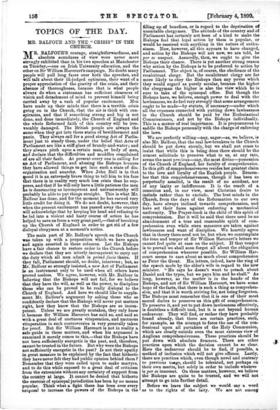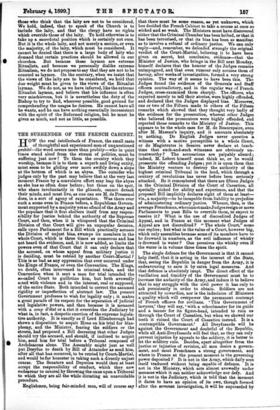TOPICS OF THE DAY.
MR. BALFOUR AND THE " CRISIS" IN THE CHURCH.
MR. BALFOUR'S courage, straightforwardness, and absolute soundness of view were never more strongly exhibited than in his two speeches at Manchester on Tnesday,—one on Irish University education, and the other on Sir William Harcourt's campaign. No doubt many people will pull long faces over both the speeches, and will talk about their ill-judged optimism, their want of a proper appreciation of the gravity of the crisis, and their absence of thoroughness, because that is what people always do when a statesman has sufficient clearness of vision and detachment of mind to prevent himself being carried away by a rush of popular excitement. Men have made up their minds that there is a terrible crisis going on in the Church, that the air is thick with con- spiracies, and that if something strong and big is not done, and done immediately, the Church of England and the whole Reformed faith of this country will be irre- vocably damaged. The British people are always the same when they get into these states of bewilderment and panic. They always call for a good strong Act of Parlia- ment just to steady them, under the belief that Acts of Parliament are like a stiff glass of brandy-and-water; and they always pitch upon a certain man, or body of men, and declare that the difficulties and muddles complained of are all their fault. At present every one is calling for an Act of Parliament, and abusing the Bishops because they have allowed things to get into such a state of dis- organisation and anarchy. When John Bull is in that wood it is an extremely brave thing to tell him to his face that there is in reality very much less crisis than he sup- poses, and that if he will only have a little patience the men he is denouncing as incompetent and untrustworthy will probably be able to put things straight. This is what Mr. Balfour has done, and for the moment he has earned very little credit for doing it. We do not doubt, however, that when the present excitement has passed away the country will acknowledge that by keeping his head and refusing to be led into a violent and hasty course of action he has helped to save us from a very great peril,—that of breaking up the Church of England in order to get rid of a few disloyal clergymen at a moment's notice.
The main part of Mr. Balfour's speech on the Church was taken up with a proposition which we have again and again asserted in these columns. Let the Bishops have a fair chance to restore order in the Church before we declare that they are utterly incompetent to carry out the duty which all men admit is primci facie theirs. If they fail, Parliament should, no doubt, intervene ; but, as Mr. Balfour so strongly insisted, a new Act of Parliament is an instrument only to be used when all others have proved useless. We agree, however, with Mr. Balfour in believing that the Bishops will not fail, for we believe that they have the will, as well as the power, to discipline those who can be proved to be really disloyal to the Church of England, And here we should like to supple- ment Mr. Balfour's argument by asking those who so confidently declare that the Bishops will never put matters right, how they know that the Bishops are so incom- petent. Unless we are greatly mistaken, they only know it because Sir William Harcourt has said so, and said so with a great deal of unctuous vituperation, and unctuous vituperation in such controversies is very generally taken for proof. But Sir William Harcourt is not in reality a safe guide in these matters, and when his argument is examined it merely comes to this,—that the Bishops have not been sufficiently energetic in the past, and, therefore, cannot be trusted in the future. But why were the Bishops not sufficiently energetic in the past? Is not their apathy in great measure to be explained by the fact that hitherto they have never felt they had public opinion behind them ? Remember that they were called upon to make martyrs, and to do this while exposed to a great deal of criticism from the extremists without any certainty of support from the country at large. It cannot be denied that hitherto the exercise of episcopal jurisdiction has been by no means popular. .Think what a fight there has been over every Proposal to increase the powers of the Bishops in the filling up of benefices, or in regard to the deprivation of unsuitable clergymen. The attitude of the country and of Parliament has certainly not been of a kind to make the Bishops feel that legal action by them is popular, or would be received with anything in the nature of enthu- siasm. Now, however, all this appears to have changed, and action by the Bishops will not now, we are told, be per se suspect. Assuredly, then, we ought to give the Bishops their chance. There is yet another strong reason why action by the Bishops is to be preferred to action by Parliament. The object is, of course, the obedience of the recalcitrant clergy. But the recalcitrant clergy are far more likely to obey the Bishops than any power which they would regard as purely secular, because the higher the clergyman the higher is also the view which he is sure to take of the episcopal office. But though the Bishops have, we believe, enough power to deal with the lawlessness, we do feel very strongly that some arrangement ought to be made—by statute, if necessary—under which all the expenses connected with putting down lawlessness in the Church should be paid by the Ecclesiastical Commissioners, and not by the Bishops individually. This is a matter of real importance. It is preposterous to saddle the Bishops personally with the charge of enforcing the laws.
We are perfectly willing—nay, eager—as, we believe, is also Mr. Balfour, that the real law-breakers in the Church should be put down sternly, but we shall not cease to insist that while this is being done there should be the utmost solicitude to preserve what to us, at any rate, seems the most precious—nay, the most divine—possession of the Church of England, her faculty of comprehension. In this gift of comprehensiveness resides her greatest claim to the love and loyalty of the English people. Remem- ber that this comprehensiveness, though it has been so perpetually assailed, is the result of no accident, nor of any laxity or indifference. It is the result of a conscious and, in our view, most Christian desire to include rather than to exclude. The best minds in the Church, from the days of the Reformation to our own day, have always inclined towards comprehension, and have set their faces against enforcing a mechanical uniformity. The Prayer-book is the child of this spirit of comprehension. But it will be said that there need be no abandonment of a true and reasonable spirit of com- prehension even while stern measures are taken against lawlessness and want of discipline. We heartily agree that in theory there need not be, but when we contemplate the tone and temper of Sir William Harcourt's letters we cannot feel quite at ease on the subject. If that temper is to prevail we shall soon forget all about the obligation of comprehension wherever possible. Sir William Her- court seems to care about as much about comprehension as Peter the Great. His letters, indeed, have the ring of the speech made by the elder's wife in regard to the new minister. " He says he doesn't want to preach about Daniel and the types, but we pays him and he shall." As long, however, as the matter is in the hands of the Bishops, and not of Sir William Harcourt, we have some hope of the facts, that there is such a thing as comprehen- sion, and that it is worth striving for, not being forgotten. The Bishops must remember that it is one of their most sacred duties to preserve us this gift of comprehension. To preserve it, and yet to put down lawlessness effectively, is doubtless a difficult task, but it is not beyond human endeavour. They will find, or rather they have probably found already, that there are certain practices, such, for example, as the attempt to force the use of the con- fessional upon all partakers of the Holy Communion, which are clearly outside even the most extreme view of Anglican comprehensiveness. These practices should be put down with absolute firmness. There are other practices upon which the decision cannot be so clear. Here the endeavour should be to find, if possible, a. method of inclusion which will not give offence. Lastly, there are practices which, even though novel and contrary to previous usage, should be tolerated, not perhaps on their own merits, but solely in order to include whateve is per se innocent. On these matters, however, we believe the Bishops are quite to be trusted, and we will not attempt to go into further detail.
• Before we leave the subject we would say a word as to the rights of the laity. We are not among those who think that the laity are not to be considered. We hold, indeed, that to speak of the Church is to include the laity, and that the clergy have no rights which override those of the laity. To hold otherwise is to take up a sacerdotal position which is certainly not ours. But it is the whole laity, and not merely a section, or even the majority, of the laity, which must be considered. It cannot be denied that there is a large body of laity who demand that certain practices should be allowed in our churches. But because these laymen are extreme Ritualists, and because we personally dislike extreme Ritualism, we do not propose to say that they are not to be counted as laymen. On the contrary, when we insist that the views of the laity are to be considered, we hold that due weight must be given to the views of the Ritualist layman. We do not, as we have inferred, like the extreme Ritualist layman, and believe that his influence is often very mischievous, but it is nevertheless the duty of the Bishop to try to find, wherever possible, good ground for comprehending the usages he desires. He cannot have all he wants, and he can have nothing essentially inconsistent with the spirit of the Reformed religion, but he must be given as much, and not as little, as possible.



































 Previous page
Previous page